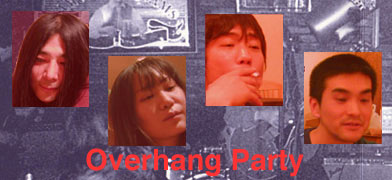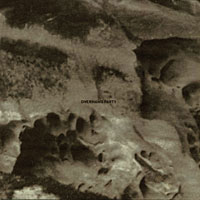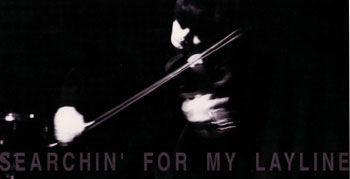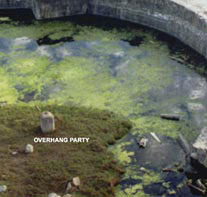Overhang Party: Searchin' for the Layline
The Music Series > Asakusa Jinta > Boris > Shibusashirazu > Mad3 > Keiji Haino > Ghost > Overhang Party
The Captain's
hard-nosed style of reporting is seen by many as a bit brash.
Where many might turn their heads at a particular topic, it
is the Captain who will be just beginning to focus his stare.
"The tough story is my story," he'll often say.
 This
week is no exception as he takes a peek at life in Japan's
underground music scene. So get those headphones on. The Captain
will no doubt crank this one up to eleven.
This
week is no exception as he takes a peek at life in Japan's
underground music scene. So get those headphones on. The Captain
will no doubt crank this one up to eleven.
Slumped over his upright guitar
case, Rinji Fukuoka pulls on a cigarette amid nighttime commuters
streaming through JR Meguro
Station. The tall, long-haired singer and guitar player of
Overhang Party,
one of the most prominent bands in Japan's underground rock
scene, is flanked on both sides by his bandmates.
A station attendant approaches the group and scolds: "Excuse
me, excuse me, smoking
is prohibited inside the station."
At that, Fukuoka shrugs his shoulders and thrusts
the offending element - ash-end first - toward the attendant,
who, after reluctantly accepting, grimaces and storms off.
This incident is not all that surprising. This
four-piece's sound, like Fukuoka's regard for authority, is
usually intense and dissonant.
"High tension music results in a high
voltage reaction," explains the 35-year old Fukuoka.
Getting any kind of reaction, musically or otherwise, in an
outwardly conformist society like Japan (and its exceptionally
bland music industry), isn't easy, and generally not encouraged
from the start. But for Overhang Party, making an impact upon
the listener with their sound, even if some might think of
it as "noise," is exactly the point.
 Otherside
of is their most recent double CD live release and
a perfect example. The opener, "Kizashi," roars
with a steady howl as guitars mix with background drum and
bass in an ongoing progression that builds to searing aircraft
turbine-sounding heights. This sets the stage for an album
that mixes ambient elements and layers of feedback improvisation
to make for album that is not for the faint of heart.
Otherside
of is their most recent double CD live release and
a perfect example. The opener, "Kizashi," roars
with a steady howl as guitars mix with background drum and
bass in an ongoing progression that builds to searing aircraft
turbine-sounding heights. This sets the stage for an album
that mixes ambient elements and layers of feedback improvisation
to make for album that is not for the faint of heart.
Early releases weren't quite as complicated.
Their self-titled debut rocks straight from the start. Guitars
wail and drums pound amid Rinji's straight-ahead deadpan delivery
of lyrics with references nature
and spirituality.
For Rinji - and the rest of the band - any
changes in sound over time are just happenstance. "When
you are listening [to our later work] it is kind of different
for the listeners, but for us it is the same."
Indeed, for Overhang Party, making music is
primarily about making a feeling, as their reiterating motto,
"Searchin' for my layline," ambiguously describes.
"If you think of a dowser," Rinji
explains, "he is searching for water that you can't see.
A layline is not actually water, but maybe something unusual.
It is not necessarily something important - it is just that
you need it."
Though a play on words from the lyrics of "Sister
Ray," the Velvet Underground's epic feedback-filled monstrosity
about murder, sex, and dope in a scene of urban insanity,
Fukuoka maintains that the junkie character's attempts to
shoot a load of heroin is not directly related. But the overally
Velvet Underground influence is obvious.
 Rinji's
live duo release with Jutoku Kaneko, Searchin' for My Layline,
features a screeching viola and random guitar noodling that
could likely only be appreciated by devoted fans of the experiments
of Lou Reed and John Cale.
Rinji's
live duo release with Jutoku Kaneko, Searchin' for My Layline,
features a screeching viola and random guitar noodling that
could likely only be appreciated by devoted fans of the experiments
of Lou Reed and John Cale.
Influences are one thing, but being pegged
as Japan's version of the Velvet Underground - or even a member
of its infamous "noise" scene - is not Overhang
Party's intention.
"We don't want to be lumped in the underground,"
cautions Rinji of the scene which has seen bands like the
Ruins and Keji Haino gaining international respect for their
unique, rapid-fire drumming and sledgehammer-like guitar work,
respectively. "We are not scared of staying in the same
place, but we always need a change. I want to make a truly
alternative style."
Their last studio recording - Overhang
4 - is a statement along these lines; it shows the
band at its most original and complicated. Pianos and violins,
most of which are stripped away during performances, are brought
to the forefront to make an album filled with depth and complexity.
Certainly, the American psychedelic scene,
the pioneers of Japanese free-style jazz, like Kaoru Abe,
and the drone-filled experimentations of the Taj Mahal Travelers
of 30 years ago, have been highly influential. But making
music is just part of a bigger picture.
"I don't think about whether I am an artist
or a musician," says drummer Iwao Yamazaki, who along
with Rinji comprise the only remaining founding members still
in the group. "I get influences from all things, not
this person or this thing."
 The
band formed in the early '90s. Like today, it was a time when
it was difficult for rock music to make an impact on a wide
scale with the music scene being dominated by generic "million
hits" pop artists. Of course, rock scenes exist inside
various pockets of the thousands of small clubs that stretch
from Hokkaido to Kyushu, but Rinji reckons that Japan's rock
scene is too caught up in a steady stream of predictable complacency:
"It is too easy to hear rock music in Tokyo."
The
band formed in the early '90s. Like today, it was a time when
it was difficult for rock music to make an impact on a wide
scale with the music scene being dominated by generic "million
hits" pop artists. Of course, rock scenes exist inside
various pockets of the thousands of small clubs that stretch
from Hokkaido to Kyushu, but Rinji reckons that Japan's rock
scene is too caught up in a steady stream of predictable complacency:
"It is too easy to hear rock music in Tokyo."
Overhang Party began by being featured on two
compilation releases by the legendary label P.S.F.
Since then, Rinji has been releasing Overhang Party material
- with a number of different band lineups - on his own Pataphysique
label, established to ease the reliance of someone else getting
the band's material in the hands of the fans. Initial presses
of each release number around three hundred with second presses
matching that or slightly exceeding.
Though still a relative unknown in Japan, their
initial albums allowed for an American tour of the Northeast
and Midwest in 1999, a chance for American fans to hear the
band shine - when studio overdubbing is out and improvisation
is in. This tour included performing in front of up to 200
people and live radio appearances.
Rinji says: "What is good about the U.S.
is that there is more open space - it is huge. Tokyo is the
worst place to have any kind of freedom. In the U.S., you
just get in a car and go."
The experience was also an eye-opener to the
variety of possibilities the U.S. holds. Iwao likens the pimp-like
attire and angry guard dog of their Cleveland contact person
to something "out of a Tarantino movie." Of this
same gentleman, Rinji politely declined his offer of a plump,
"rainbow-colored" pill - an opportunity he would
have typically taken, he says, had there not been one more
date left on the schedule for the next evening.
A new album is (hopefully) in the works down
the line, but a new approach for the band is not.
"We don't want to worry about our technique.
It is more about expressing a feeling," Rinji says. "Because
we are not getting better as musicians, we are just doing
what we want to do."
Note: Ai Matsui contributed to this report
from the Tokyo Bureau. Catch
Overhang Party live at the Silver
Elephant in Kichijoji on June 4th.
The Music Series > Asakusa Jinta > Boris > Shibusashirazu > Mad3 > Keiji Haino > Ghost > Overhang Party

